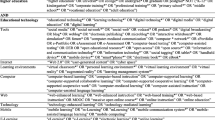Abstract
The reported study is situated within the process of developing a reform-oriented national mathematics curriculum for compulsory education in Greece by a design team that involved teachers, academic researchers, and policy-makers. From an activity theory perspective, we identify the activity systems of mathematics teaching, research in mathematics education, and educational policy interacting in the design process. We focus on the contradictions between the three activity systems and how these were dealt with. We based our analysis on email exchanges during the curriculum design, field notes from whole-team sessions, and interviews with key persons. Our results highlight that the emerging contradictions primarily concerned the teaching and research activity systems. Members of the team who acted as brokers between the different activity systems and facilitated their interaction played an important role in overcoming the contradictions.

Similar content being viewed by others
References
Adler, J., Ball, D. L., Krainer, K., Lin, F.-L., & Novotna, J. (2005). Reflections on an emerging field: Researching mathematics teacher education. Educational Studies in Mathematics, 60(3), 359–381.
Akkerman, S. F., & Bakker, A. (2011). Boundary crossing and boundary objects. Review of Educational Research, 81, 132–169.
Akkerman, S. F., Bronkhorst, L. H., & Zitter, I. (2013). The complexity of educational design research. Quality & Quantity, 47(1), 421–439.
Charmaz, K. (2006). Constructing grounded theory. A practical guide through qualitative analysis. London, UK: Sage.
Choppin, J. (2011). Learned adaptations: Teachers’ understanding and use of curriculum resources. Journal of Mathematics Teacher Education, 14(5), 331–353.
Clark-Wilson, A., Hoyles, C., Noss, R., Vahey, P., & Roschelle, J. (2015). Scaling a technology-based innovation: Windows on the evolution of mathematics teachers’ practices. ZDM—the International Journal on Mathematics Education, 47(1), 79–92.
Coburn, C. E. (2003). Rethinking scale: Moving beyond numbers to deep and lasting change. Educational Researcher, 32(6), 3–12.
Cochran-Smith, M., & Lytle, S. (1999). Relationships of knowledge and practice: Teacher learning in communities. In P. Pearson & A. Iran-Nejad (Eds.), Review of research in education, 24 (pp. 249–307). Washington, D. C.: American Educational Research Association.
Edwards, R., & Fowler, Z. (2007). Unsettling boundaries in making a space for research. British Educational Research Journal, 33(1), 107–123.
Engeström, Y. (1999). Innovative learning in work teams: Analysing cycles of knowledge creation in practice. Ιn Y. Engeström, R. Miettinen, & R-L. Punamäki (Eds.), Perspectives on activity theory (pp. 377–406). Cambridge: Cambridge University Press.
Engeström, Y. (2001). Expansive learning at work: Toward an activity theoretical reconceptualization. Journal of Education and Work, 14, 133–156.
Engeström, Y., Engeström, R., & Kärkkäinen, M. (1995). Polycontextuality and boundary crossing in expert cognition: Learning and problem solving in complex work activities. Learning and Instruction, 5, 319–336.
Hoyles, C., & Ferrini-Mundy, J. (2013). Policy implications of developing mathematics education research. In M. A. Clements, A. Bishop, C. Keitel, J. Kilpatrick, & F. Leung (Eds.), Third international handbook of mathematics education (pp. 485–514). New York: Springer.
Hung, D., Lim, K., & Huang, D. (2010). Extending and scaling technology-based innovations through research: The case of Singapore. In Organisation for Economic Co-operation and Development (Ed.), Inspired by technology, driven by pedagogy [electronic resource]: A systemic approach to technology-based school innovations (pp. 89–102). OECD Publishing.
Krainer, K. (2014). Teachers as stakeholders in mathematics education research. The Mathematics Enthusiast, 11(1), 49–60.
Krainer, K., & Zehetmeier, S. (2013). Inquiry-based learning for pupils, teachers, researchers, and representatives of educational administration and policy: Reflections on a nation-wide initiative fostering educational innovations. ZDM—the International Journal on Mathematics Education, 45(6), 875–886.
Kynigos, C., Philippou, G., Potari, D., & Sakonidis, H. (2009). Research in mathematics education in Greece and Cyprus. In M. Tzekaki, H. Sakonidis, & M. Kaldrimidou (Eds.), Proceedings of the 33rd conference of the International Group for the Psychology of Mathematics Education (Vol. 1, pp. 303–322). Thessaloniki, Greece: Aristotle University.
Remillard, J. (2005). Examining key concepts in research on teachers’ use of mathematics curricula. Review of Educational Research, 75(2), 211–246.
Roesken, B., Hoechsmann, K., & Toerner, G. (2008). Pedagogies in action: The role of mathematics teachers’ professional routines. Paper presented at the Symposium on the Occasion of the 100th Anniversary of ICMI (Rome, 5–8 March, 2008). Retrieved fromhttp://www.unige.ch/math/EnsMath/Rome2008/WG2/Papers/ROHOTO.pdf.
Roesken-Winter, B., Hoyles, C., & Blömeke, S. (2015). Evidence-based CPD: Scaling up sustainable interventions. ZDM—the International Journal on Mathematics Education, 47(1), 1–12.
Wenger, E. (1998). Communities of practice. Learning, meaning and identity. New York, NY: Cambridge University Press.
Author information
Authors and Affiliations
Corresponding author
Rights and permissions
About this article
Cite this article
Potari, D., Psycharis, G., Sakonidis, C. et al. Collaborative design of a reform-oriented mathematics curriculum: contradictions and boundaries across teaching, research, and policy. Educ Stud Math 102, 417–434 (2019). https://doi.org/10.1007/s10649-018-9834-3
Published:
Issue Date:
DOI: https://doi.org/10.1007/s10649-018-9834-3




